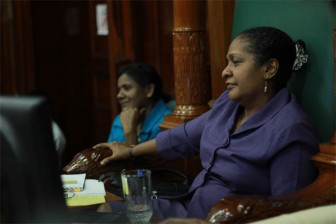The National Assembly last night passed the Sexual Offences (Amendment) Bill which saw the support of the entire House as the Administration moved to correct what is being called an oversight on the part of the persons who were involved in the passage of the landmark principal 2010 Act.
The government in August last year tabled the Sexual Offences (Amendment) Bill 2012 aimed at according to the accused the same rights as the prosecution with regard to submission of statements for paper committals. The Bill when passed into law would also allow for statements written on behalf of a child to carry a mark made by that child if he or she is unable to sign his or her name.

Clause 4 of the Bill seeks to amend the Schedule of the Principal Act to give the accused the right to lead evidence or submit written statements and it would be prejudicial to the accused if the accused does not have this right in the paper committal process.
The Bill said that there is now a level playing field as regards submission of evidence by the prosecutor and the accused.
Clause 5 of the Bill seeks to provide that the new committal procedure applies to legal proceedings pending the commencement of the Act and the legal proceedings instituted on or after the commencement of the Act.
The need for the new piece of legislation became apparent when acting Chief Justice Ian Chang made a ruling citing the unconstitutionality of the Sexual Offences Act in its extant form.
Speaking on the Bill yesterday, Attorney General Anil Nandlall spoke of the need for the Bill to be passed post-haste since cases are being held up. He said that the Director of Public Prosecutions was not proceeding with cases involving rape until the amendment was passed and as a result there is a build up in the courts of such cases.
The Chief Justice had said in his ruling that several sections of the Sexual Offences Act are unconstitutional in as much as they did not accord to the accused person certain facilities which are guaranteed to an accused person in a criminal trial by the fundamental rights provision of the Constitution.
“We could have appealed the Chief Justice’s ruling…but we made a choice to amend the legislation rather than appealing and keeping it in the system for a long time,” said Nandlall.
Speaking on the Bill, MP Basil Williams of the APNU declared his party’s support for the Bill. “We believe the amendment is just and we have no difficulty supporting it,” he said. Minister of Human Services and Social Security Jennifer Webster said that the Bill will ensure that Guyana’s laws are in line with legal and international guidelines. She rejected the criticisms that there had been no consultations on the Bill and said that it is a very critical amendment to the Sexual Offences Act of 2010.
Speaking on the Bill, Leader of the Alliance For Change (AFC) Khemraj Ramjattan said that the Bill has the fullest support of his party. “It was an oversight on the part of parliamentarians that makes the Bill necessary,” he pointed out.
Prior to the passage of this Bill, the Government and the Opposition engaged in an almost two and a half hour debate on a Motion on the 40th anniversary of Guyana’s establishing of diplomatic relations with Cuba.
The next sitting of the National Assembly will take place on Thursday December 10, 2013.






